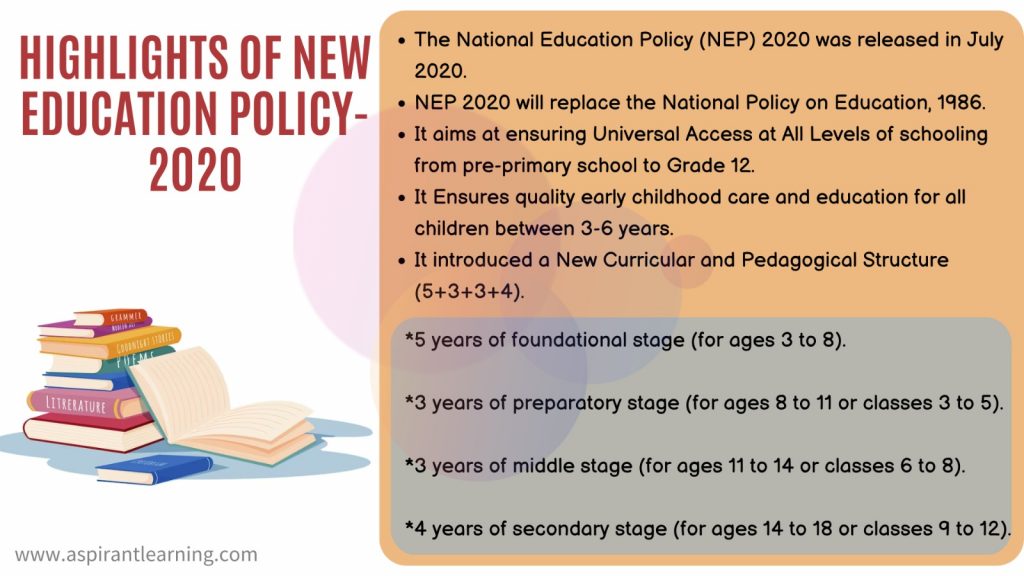News Highlights:
- The New India Literacy Programme aims to make one crore adults literate this year but relies on volunteer teachers and college students due to insufficient funds to hire teachers exclusively for adults.
- According to Education Ministry data, there are currently 15 to 20 crore illiterate people in India who do not know how to read and write.
The New India Literacy Programme:
- About:
- New India Literacy Programme (NILP) intends to support the States and Union Territories in promoting literacy among non-literates in the age group of 15 and above across the country covering 5 crore non-literates during the implementation period from 2022-23 to 2026-27.
- It covers all the aspects of Adult Education to align with National Education Policy 2020.
- The Scheme replaced the term “Adult Education” with “Education For All”.
- Fund for the scheme:
- The scheme has been approved with a financial outlay of Rs.1037.90 crore, including a Central share of Rs.700.00 crore and a State share of Rs.337.90 crore.
- The Union and State shares are in the ratio of 60:40 for all States other than the North Eastern Region (NER) and the Himalayan States, where the sharing pattern between the Union and the State is in the ratio of 90:10.
- For Union Territories (UTs) with the legislature, the ratio is 60:40, except in the UT of Jammu and Kashmir where the ratio is 90:10, and for all other UTs without legislature, the Central share is 100%.
- Objectives of the Scheme:
- It aims to develop critical life skills, including commercial skills, financial literacy, digital literacy, child care and education, health care and awareness, and family welfare.
- To develop Vocational skills to discover work in his/her area.
- Continuing education: including interesting holistic adult learning courses in the arts, sciences, technology, culture, games, and leisure, as well as other areas of interest or utility to local learners, like advanced content on important life skills.
- Five components of the scheme:
- Foundational Literacy and Numeracy
- Critical Life Skills
- Vocational Skills Development
- Basic Education
- Continuing Education
- Steps taken by the Government for Implementation:
- Identify the beneficiaries and Volunteer Teachers: Surveys of beneficiaries and Volunteer Teachers (VTs) are being conducted by States/UTs using schools as the base.
- Volunteer teachers are trained to carry out the learning modules online.
- States/UTs are conducting various workshops.
- The teaching and learning material is available on the DIKSHA portal developed by the National Council of Educational Research and Training (NCERT).
- Environment-building activities by using social media platforms, including Print/Electronic/Folk Media, to reach across the country.

Empowering Initiatives of the Government
- Samagra Shiksha Scheme:
- It is an integrated school education plan that runs from pre-school to class XII to ensure inclusive and equitable educational quality at all tiers.
- National Digital Literacy Mission:
- By the year 2020, it seeks to provide at least one member in each household with critical digital literacy skills.
- Pradhan Mantri Gramin Digital Saksharta Abhiyan:
- This is one of the country’s greatest efforts aimed at making people technologically literate.
- Digital India Programme:
- It brings together a variety of ongoing programmes by reorganising and refocusing them and then putting them into action in a coordinated manner.
- National Skill Development Corporation (NSDC):
- Its goal is to encourage the formation of large, high-quality, for-profit vocational institutions to foster skill development.
- It functions as a stimulus for skill development by making available funds to firms, organisations, and companies that give skill training.
Way Forward:
- There is a need for real emancipation of the people.
- Education systems across the world should provide the training required for children and working adults so that they can learn to read and write.
- National educational plans should include schooling for children and literacy training for adults as parallel elements.
Pic Courtesy: Freepik
Content Source: The Hindu



